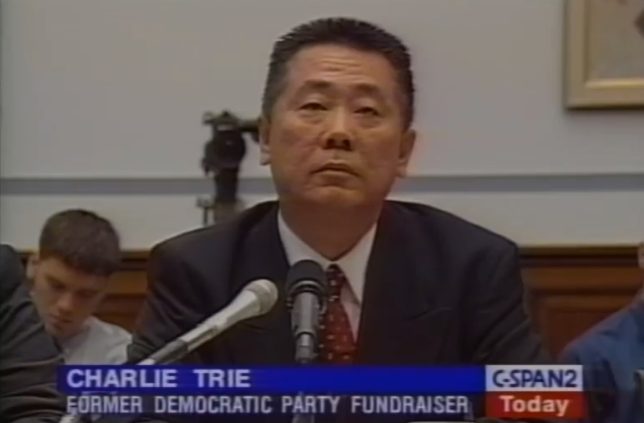Deception & Misdirection
When the Chinese Weapons Merchant Visited the Clinton White House
 Charlie Trie testifying before the House Government Reform and Oversight Committee on MARCH 1, 2000. Source: C-SPAN.
Charlie Trie testifying before the House Government Reform and Oversight Committee on MARCH 1, 2000. Source: C-SPAN.

On this date 24 years ago (February 6, 1996), the Clinton White House hosted what the Wall Street Journal later described as a “reception for donors.” The guest list included Yah Lin “Charlie” Trie, then an obscure former Arkansas restauranteur, who brought with him Wang Jun, the chairman of a Chinese weapons trading company. The odd couple’s visit to see President Bill Clinton that morning was one of the more suspicious of the many illegal money-gulping schemes that comprised the 1996 Democratic National Committee (DNC) campaign finance controversy.
A comprehensive new profile of former President Clinton posted at InfluenceWatch.org explains the saga of the DNC fundraising scandal and other events from the turbulent Clinton administration.
Clinton and Trie
The Clinton profile explains how the scandal began:
Prior to Clinton’s 1996 re-election the Democratic National Committee received at least $2.8 million in donations later identified as suspect or illegal because the money originated from donors in the People’s Republic of China and other Asian nations. (It is illegal for foreign nationals to donate to U.S. federal elections.) The Wall Street Journal broke the story of the donations in early October 1996, one month before the election. Five months later in March 1997 the Washington Post reported that earlier in 1996 the FBI had briefed six members of Congress, including U.S. Sen. Dianne Feinstein (D-California), that federal law enforcement had discovered a plot by the “government of China” to “spend nearly $2 million to buy influence not only in Congress but also within the Clinton administration.”
The Washington Post reported that Trie had been chummy with Clinton dating back to Trie’s Arkansas days running a restaurant in Little Rock, which the former governor and future president “visited frequently.” An FBI investigation cited by the Post noted that in 1990 Trie opened an “import-export business” that “failed to make any money.” But the Post reported Trie’s fortunes changed when he relocated to Washington, DC, “opened an office in the Watergate complex and became a Democratic fund-raiser and man about town.”
Trie raised nearly $1.3 million for the DNC and a legal defense fund established for Clinton. Most of it was later returned after the discovery that it was contributed illegally by foreign donors. Trie was one of many figures who received federal convictions from the scandal. He later pled guilty to “violating federal campaign finance laws by making political contributions in someone else’s name and by causing a false statement to be made the FEC [Federal Election Commission].”
John Huang
The central figure in the DNC fundraising scandal was John Huang, a former high-ranking employee of the Lippo Group, a large Indonesian banking and real estate conglomerate also involved in the controversy. The InfluenceWatch.org profile covers Huang’s longstanding relationship with President Clinton:
Explaining Huang’s background, the [Washington] Post said he “worked and socialized with a number of friends and associates of Bill and Hillary Rodham Clinton” and that in 1985, when Clinton was the Arkansas governor, Huang “escorted the Clintons and an Arkansas group at a seminal Asia trade mission.” Before becoming an executive with the Lippo Group, Huang had been an employee of Lippo-connected Worthen Bank in Little Rock, Arkansas.
According to the Wall Street Journal, Huang was working as an official in the U.S. Department of Commerce in 1995 when it was decided during a September 1995 meeting at the White House to move him to a position as a senior fundraiser for the DNC. The Journal reports that President Clinton, Huang, James Riady and “Arkansas businessman Joseph Giroir” were all present at this meeting. Giroir, according the newspaper, was a former chairman of the Rose Law Firm where Hillary Clinton had been a partner, and in April 1993 had formed a business arrangement with the Lippo Group to help it arrange business with “American companies seeking to do business in Indonesia and China.”
In August 1999, Huang pled guilty to a federal charge of felony conspiracy related to illegal campaign contributions.



